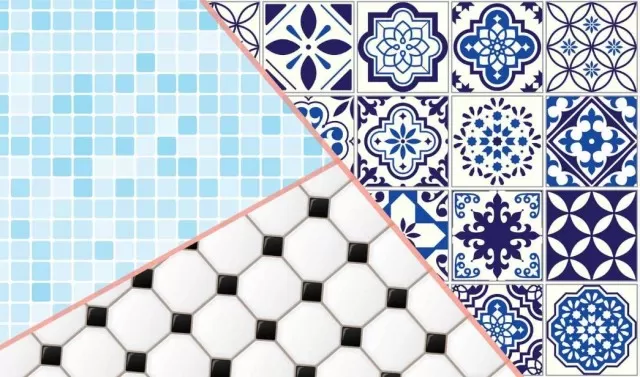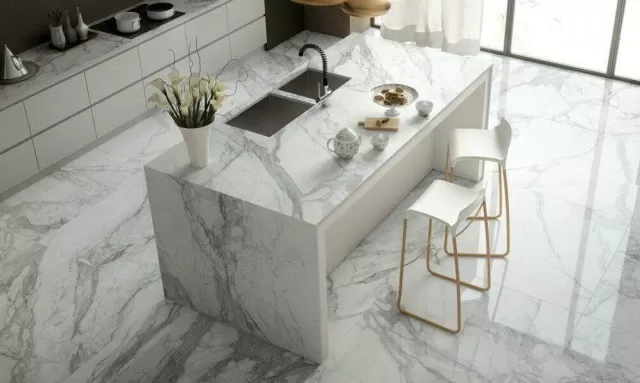Tile is a highly durable material that is commonly used in high-traffic areas like kitchens, bathrooms, and laundry rooms due to its longevity.
It is often utilized for backsplashes, flooring, and showers, and generally requires regular cleaning to maintain its appearance.
However, when spills and accidents occur, stains can easily develop on tile surfaces and become challenging to eliminate. In particular, tiled showers can accumulate stubborn stains from hard water and rust, necessitating more intensive cleaning methods.
By following these guidelines on how to remove stains from tiles, you can effectively keep your floors and backsplashes free from blemishes.
Tile Stain Removal Tips for Various Tile Types

Tiles can be made from different materials such as ceramic, porcelain, marble, slate, and various natural stones.
Each type of tile requires specific cleaning and care methods when it comes to removing stains. It is essential to follow the manufacturer’s recommendations for the best stain removal approach.
Glazed ceramic and porcelain tiles are generally highly durable and can withstand most stain-removal techniques.
However, it is crucial to handle stains on natural stone tiles, such as limestone, travertine, or marble, with extra caution. Traditional cleaners may contain chemicals that can harm the surface, so it is important to use non-abrasive cleaners specifically formulated for natural stone.
Avoid using cleaners with acidic ingredients like lemon or vinegar on natural stone and refrain from scrubbing with stiff-bristled brushes that may cause scratches.
How to Remove Stains from Tiles

While tiles may appear resistant to damage, they can be negatively affected without proper care.
Before cleaning, test your stain removal method on an inconspicuous area of both the tile and grout. A non-abrasive all-purpose cleaner or a specialized tub-tile-sink cleaning product is usually effective in removing most tile stains.
For stubborn stains, consider the following techniques:
Blood: Gently dab the stain with a soft cloth soaked in hydrogen peroxide or diluted bleach.
Coffee, tea, or juice: Wash the stain with a mild detergent and hot water, then blot it with hydrogen peroxide or diluted bleach.
Gum, wax, or tar: Place ice cubes in a resealable plastic bag and apply the bag to the affected area.
Once the material hardens, remove as much as possible using a craft stick. Use non-flammable paint thinner to remove any remaining residue.
Grease or fat-based stains: Clean the stain with club soda and water or a non-abrasive floor cleaner.
Ink or dye: Soak a clean cloth in diluted bleach and place it over the stain.
Leave the cloth in place until the stain disappears, then rinse thoroughly.
Iodine: Scrub the iodine stain with diluted ammonia and rinse well.
Nail polish: Remove the nail polish stain using nail polish remover.
If the stain persists, dab it with hydrogen peroxide or diluted bleach.
How to Remove Hard Water Stains from Tile

In areas like showers or near faucets and sinks, hard water stains can accumulate over time, leaving behind a filmy residue.
To protect the tile’s finish, avoid using abrasive cleaners or scouring powders that can scratch the surface. Instead, use vinegar to dissolve mineral buildup for easy removal.
(Note: This method is suitable for acid-safe tile surfaces like glazed ceramic or glass but not recommended for natural stone.) Soak a cloth or sponge with vinegar and apply it to the surface.
After allowing the vinegar to soak for a few minutes, reapply and sprinkle a small amount of baking soda onto the tile. Gently scrub the surface with a damp sponge.
Rinse with water to remove the vinegar and baking soda, and promptly dry the tile with a soft cloth to prevent water spots.
For natural stone tile, use a cleaner specifically designed for natural stone surfaces, such as Granite Gold Shower Cleaner, to remove hard water stains.
How to Remove Rust Stains from Tile

Rust stains commonly occur in tile showers or on tile floors when metal items come into contact with moisture over extended periods.
You can eliminate these dark orange stains using simple household ingredients. Create a paste by mixing equal parts lemon juice and borax, then apply the paste to the rust stain and gently rub it in.
Allow the paste to dry, rinse with water, and dry with a clean cloth. If the stain persists, repeat the process until the rust is completely removed.
*The information is for reference only.